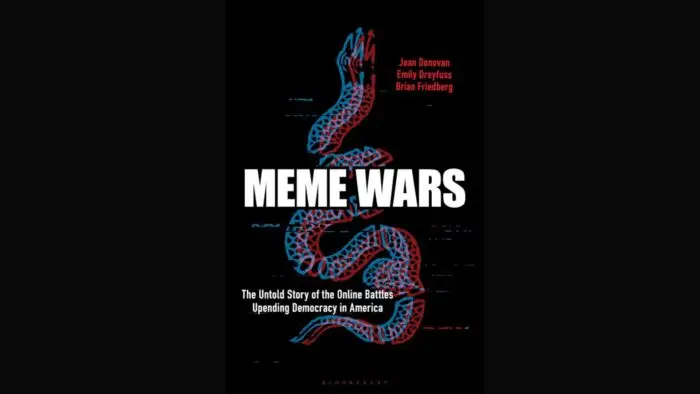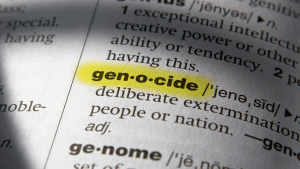Meme Wars begins with an important statement by its authors:
“All three of us share a core belief that when people talk about politics, they are really talking about media about politics.”
The relationship between media and politics today is at the same inflection point that it was in 1960 when Eric Sevareid complained about television and the advent of “The Processed Politician.” Then, as now, a new medium was already firmly entrenched in culture, although few realize its full impact.
This is the case with the contemporary internet meme.
The meme is a modern multipurpose tool. The authors mark its appearance during the 2011 Occupy Wall Street protests as instrumental in organizing people from the “wires to the weeds,” that is, from internet platforms to a real life in the streets, like Zuccotti Park in New York City. (20) Memes are also an easy means of self-identification for the many tribes inhabiting the internet today, Pepe the Frog (117) and his various spin off images being a case in point. Memes can be a simple statement of purpose like they are for QAnon followers. Memes can also express irony to obscure real intentions, but also as a method of finding out members of opposing tribes. (58)
Memes are effectively filling a vacuum created by the declining value of the written word and spoken discourse. A 2016 Carnegie Mellon University study noted that, in terms of vocabulary and grammar, presidential candidates spoke at a 6th to 8th grade level. In this environment, symbols are the new norm of our increasingly post-literate society.
Memes illustrate a critical generation gap in America that recalls “future shock,” a term coined by Alvin Toffler in 1970, indicating “too much change in too short a period of time.” At points, it applies to political parties, traditional media outlets, and tens of millions of Americans not attuned to the deeply complicated lens that the internet evokes in our social and political life. The Clinton campaign missed its significance in 2016 (133), and law enforcement repeated the same mistake prior to the January 6th Insurrection.
MEME WARS EXCERPT: Donald Trump, Meme Leader in Chief
Yet, for all the strengths that memes possess, Joan Donovan, Emily Dreyfuss and Brian Friedberg in their book Meme Wars: The Untold Story of the Online Battle Upending Democracy in America point out that their weaknesses may have an even greater role in shaping current day America. Memes are an excellent way to make grievances clear, but not their solutions. The elegant imagery created by the Occupy movement was an effective rallying point but could not foster a coherent or sustainable platform. Both Occupy and Gamergate shared the qualities of being “open-source reactionary” movements. All you had to do was click the hashtag and you became part of a cause larger than yourself. However, an easy invitation is not a substitute for a philosophy, ideology, or individual self-discipline.
The most informative parts of Memes Wars focus on the individuals who ply the worldwide web with their products, proving the old adage that a tool is only as good (or bad) as its user. What motives some of them can be both simple and personal. Milos Yiannopoulos made the point that: “This is about ritually humiliating people who have ritually humiliated you.” (102) Some internet entrepreneurs are narcissists. As Nick Fuentes said in a 2017 interview: “The biggest reason [behind my activism] is that it’s hilarious to me.” (229) In other cases, like QAnon, memes are easily transferred into merch that followers gobble up.
Individuals like Yiannopoulos and Fuentes are true internet artisans. They excel at deliberately misrepresenting information like the Wikileaks Podesta emails, which contained relatively little information in a conventional sense but offered online “deplorables … all sorts of tidbits that they could turn into cannon fodder with a little creativity and innuendo.” (146) Similarly, Fuentes demonstrated “his willingness to put his real name on his hard-right shitposting, and to follow the memes into the real world in Charlottesville.” (217)
This combination of narcissism, nihilism, and greed has serious consequences. People have died as a result of “inspirational terrorism.” (224) They did during the Unite the Right rally in Charlottesville. They did when a “brewing insurgency” online transformed into an “actual insurrection” on January 6th. (305) The Republican Party and its advocates have not escaped the meme wars. At various points, Ben Shapiro, Charlie Kirk, and Donald Trump Jr., among others have found themselves under siege. The ongoing fractiousness of warring online factions has seriously undercut not just political messaging, but the fundamental ability to govern.
And it is at this point, that Meme Wars has been overcome by events. When the book was published in 2022, Republicans held a majority in the House of Representatives, but checks and balances remained in the Senate and White House. Worst case scenarios seemed hypothetical.
That is no longer true. We saw glimmers of the meme wars in the posturing of people like Matt Gaetz or Marjorie Taylor Greene, but they are not outliers easily mocked on late-night television anymore. This summer, the Supreme Court redefined what presidential immunity means. In November, memes moved from “the wires to the weeds” into the White House. Donald Trump, a living example of our national id unleashed online, is back in charge of a movement powered by memes at the expense of coherent governance. Evidence of this is unfolding in real time from the appointment of Robert F. Kennedy as head of Health and Human Services to Trump’s recent intervention against a budget deal to keep the government running.
The upcoming reality of 2025 brings to mind Richard Hofstadter’s famous article The Paranoid Style of American Politics, published more than 60 years ago. In it, Hofstadter illustrates the article of faith among conspiracy believers that global communism had penetrated the upper tiers of government and corporate leadership. However, what once serviced McCarthyite demagoguery is now the guiding light of a country.
Be prepared to reap the whirlwind.







